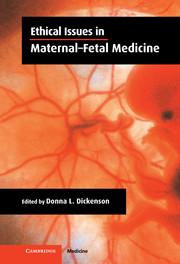Book contents
- Frontmatter
- Contents
- List of contributors
- Acknowledgements
- 1 Introduction: recent debates in maternal–fetal medicine – what are the ethical questions?
- 2 Overview: a framework for reproductive ethics
- I GENERIC ISSUES IN PREGNANCY
- 3 Multicultural issues in maternal–fetal medicine
- 4 HIV in pregnancy: ethical issues in screening and therapeutic research
- 5 Genetic screening: should parents seek to perfect their children genetically?
- 6 Is there a duty not to reproduce?
- 7 Between fathers and fetuses: the social construction of male reproduction and the politics of fetal harm
- 8 Restricting the freedom of pregnant women
- II INCEPTION OF PREGNANCY: NEW REPRODUCTIVE TECHNOLOGIES
- III FIRST AND SECOND TRIMESTER
- IV THIRD TRIMESTER
- V NEONATAL LIFE
- Index
6 - Is there a duty not to reproduce?
from I - GENERIC ISSUES IN PREGNANCY
Published online by Cambridge University Press: 29 September 2009
- Frontmatter
- Contents
- List of contributors
- Acknowledgements
- 1 Introduction: recent debates in maternal–fetal medicine – what are the ethical questions?
- 2 Overview: a framework for reproductive ethics
- I GENERIC ISSUES IN PREGNANCY
- 3 Multicultural issues in maternal–fetal medicine
- 4 HIV in pregnancy: ethical issues in screening and therapeutic research
- 5 Genetic screening: should parents seek to perfect their children genetically?
- 6 Is there a duty not to reproduce?
- 7 Between fathers and fetuses: the social construction of male reproduction and the politics of fetal harm
- 8 Restricting the freedom of pregnant women
- II INCEPTION OF PREGNANCY: NEW REPRODUCTIVE TECHNOLOGIES
- III FIRST AND SECOND TRIMESTER
- IV THIRD TRIMESTER
- V NEONATAL LIFE
- Index
Summary
Much of the language used in the debates concerning reproduction surrounds the concepts of rights and of choice: the woman's right to reproduce; her right to choose; her right to marry and found a family. Yet there is another rhetoric, one which has arisen again in recent years, that of responsible parenting, controlled choice. The argument has been advanced that individuals are not entitled to reproduce in all situations. In fact, that there may rather be certain situations in which they should not reproduce, and even that they may be required not to reproduce. It is an uncomfortable language for many in that it harks back to the eugenics debates. This paper explores the extent to which persons can ever be regarded as being under a duty not to reproduce and whether such a duty can be legally enforced. First, when might such a ‘duty’ arise? Secondly, what considerations would militate against the recognition of such a duty? Thirdly, if such a duty were recognized, then how could it actually be enforced in law? As we shall see in a moment, these are very uncomfortable questions, but new technological developments suggest that increasingly they will have to be addressed.
New reproductive technologies provide a means of controlling access to reproductive services. The clinicians act as gatekeepers in the selection of those who will have access to services. In such a situation individuals may be limited in the reproductive choices they make already through state-imposed criteria.
- Type
- Chapter
- Information
- Ethical Issues in Maternal-Fetal Medicine , pp. 101 - 112Publisher: Cambridge University PressPrint publication year: 2002

